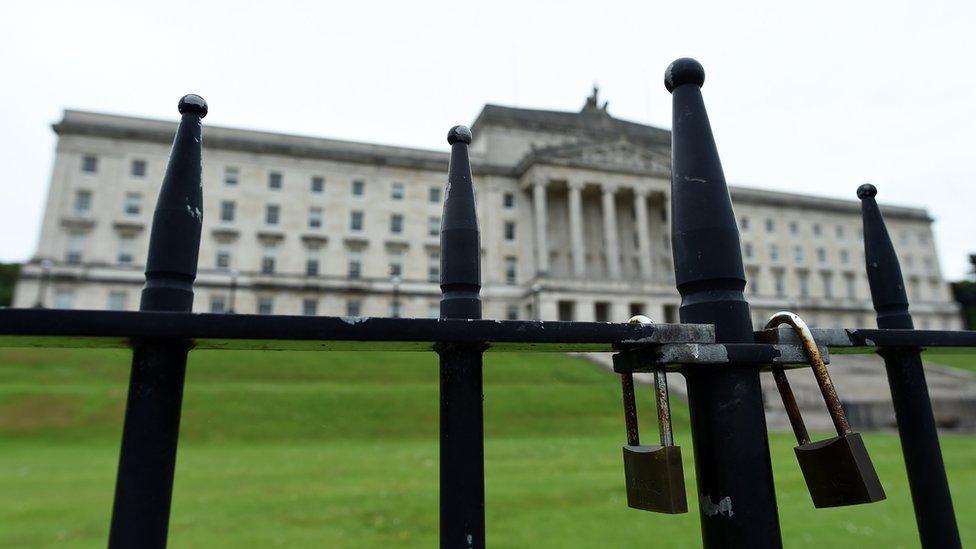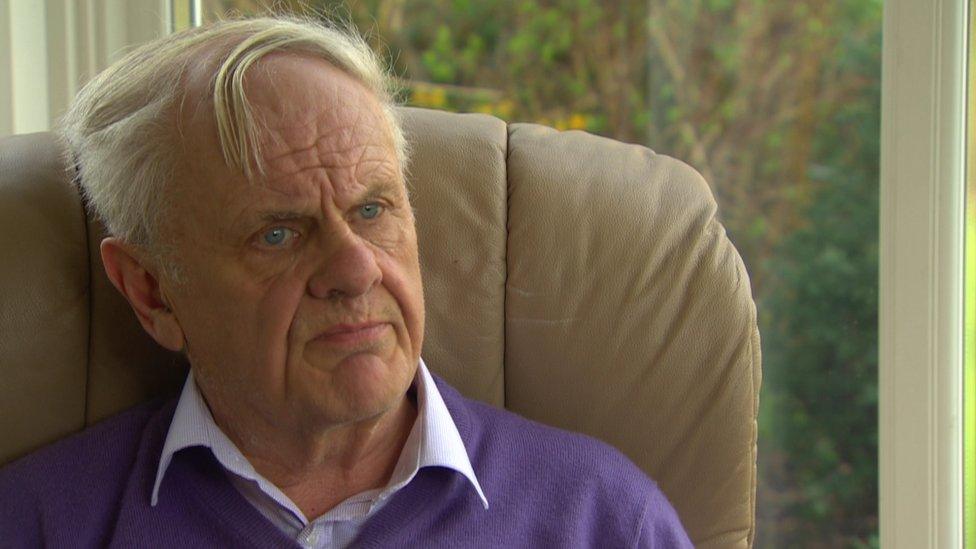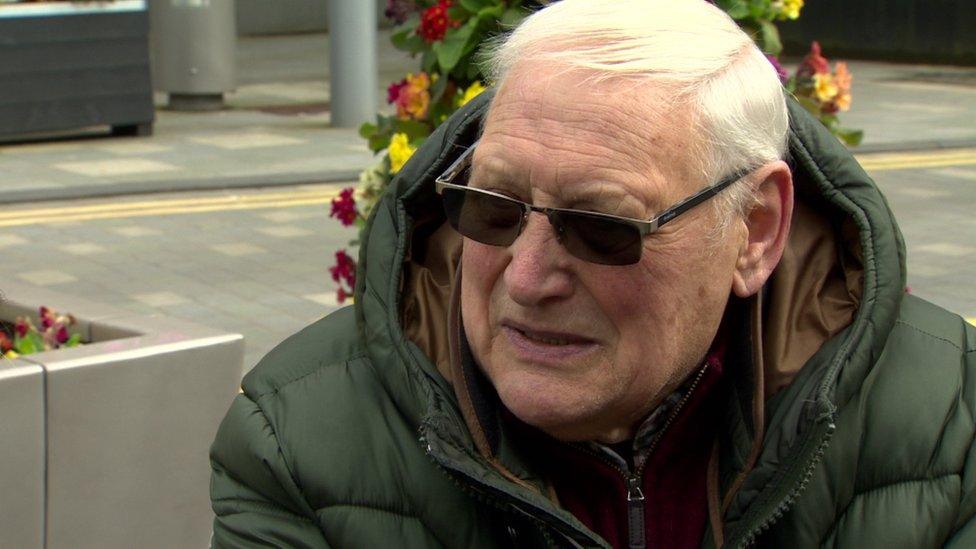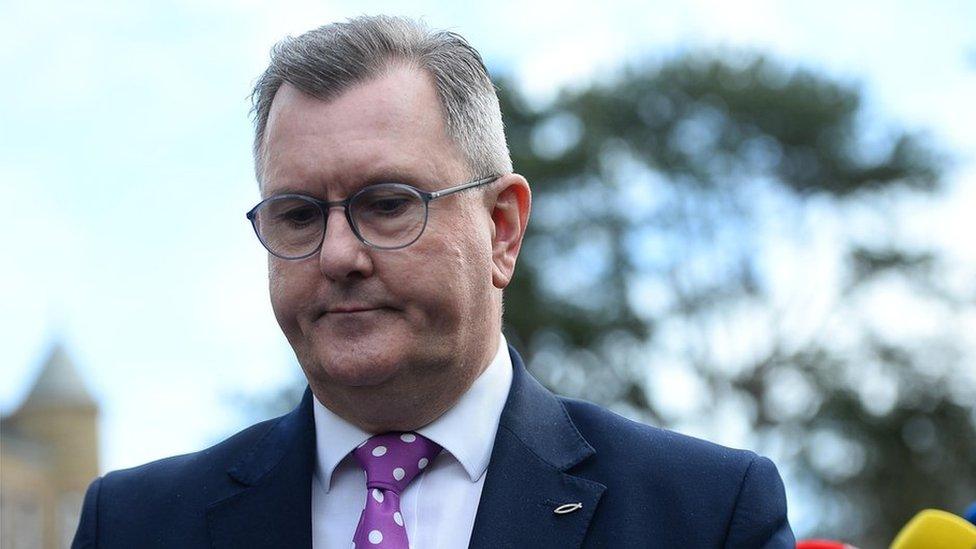Stormont stalemate hurting the poorest - former Presbyterian moderator
- Published

Northern Ireland has been without a devolved government since February 2022
A former moderator of the Presbyterian Church says he "sees no heart for the vulnerable" within mainstream unionism.
The Rev Norman Hamilton told BBC News NI the lack of government in Northern Ireland was having a detrimental impact on some of the poorest in society.
Dr Hamilton also said divisive politics was preventing good government and appealed for parties to work together.
The Democratic Unionist Party (DUP) is blocking the formation of an executive.
It is part of the party's protest against post-Brexit trading arrangements between the UK and EU.
"It really pains me to say this I do not see a heart for the marginalised and vulnerable in mainstream unionism," said Dr Hamilton.
"The big political picture is squeezing out the realities of life for so many.
"The idea of no compromise seems to me to be actually putting your head in the sand."
However, Dr Hamilton, who has in the past been involved with negotiations with loyalists and sits on the Social Democratic and Labour Party's New Ireland Commission, said it was important to acknowledge that the DUP had an electoral mandate to make decisions over whether it returned to power-sharing.

Norman Hamilton is a former moderator of the Presbyterian Church
But he said not enough was being discussed about "the ethical and moral downsides" of not having government.
"My way or no way is not confined to unionism - we see that within republicanism as well," he said.
"But as society becomes more fractured and more divisive… as politics becomes more 'in-your-face', one of the out-workings of that is there is no chance of good government.
"The emphasis needs to move from simply getting back into power, to finding ways of wanting to do good government."
'We've been sold out'
In Dr Hamilton's home town of Ballymena, County Antrim, there are some unionists who object to the idea of power-sharing itself.
The town is at the centre of the North Antrim constituency and its DUP MP Ian Paisley has been very critical of the Windsor Framework.
The framework is a deal agreed between the EU and UK to try to ease problems affecting trade between Great Britain and Northern Ireland following Brexit.
The DUP has said it still has concerns, because Northern Ireland will continue to follow some EU rules and regulations.
Robert Sampson, who has voted for the DUP for decades, said it left him feeling like he was no longer in the United Kingdom.
"I feel that we have been sold out," he said.
But his objections went beyond the framework.
Mr Sampson said he did not want the DUP's politicians forming an executive at Stormont if it meant including republicans and "wouldn't like to see a Sinn Féin first minister".
Sinn Féin was returned as the largest party in last year's assembly election and, as a result, its deputy leader Michelle O'Neill would be entitled to become first minister if Stormont returned.
Mr Sampson is fiercely opposed the party's historical links to the IRA.

Robert Sampson says he is opposed to power sharing
"Whenever they took a power sharing government, I wasn't in favour of that at all," said Mr Sampson, who is a member of the Free Presbyterian church once led by Mr Paisley's late father, the former First Minister Ian Paisley Senior.
"I didn't want to see terrorists in government, their people have murdered our kith and kin over the years."
The DUP set up a panel, including former First Ministers Peter Robinson and Baroness Foster, to gather views about the Windsor Framework.
The leadership of the party was given the panel's report at the end of March and is currently considering it.
DUP leader Sir Jeffrey Donaldson has already made clear that he would like to see the UK government push for further concessions from the EU.
But Northern Ireland Secretary Chris Heaton-Harris has said that there will be no renegotiation of the deal.
The first House of Commons vote on part of the Windsor Framework passed by 515 votes to 29.
The scale of that victory suggested that there was little support to change the deal at Westminster.
While the DUP insisted it was trying to protect the union, Dr Hamilton said he believed working with others to find compromises was a better to achieve that goal.
"You see the rows going on in Scotland around independence… you see the historic stability of the United Kingdom crumbling before our eyes," said the former moderator.
"So it does seem to me that unionism needs to be bold, visionary, inclusive and warm-hearted."
This article is the second in a series this week which will examine the future direction of unionism and politics in Northern Ireland. You can also see the reports on BBC Newsline at 18:30 BST.
Related topics
- Published3 April 2023

- Published2 February 2024
